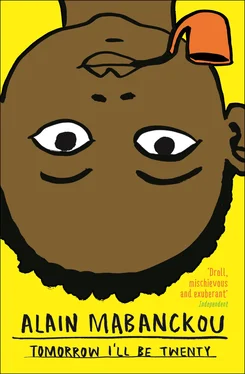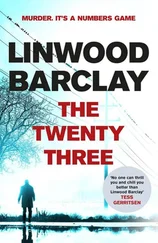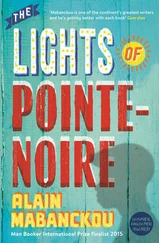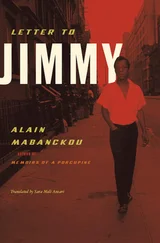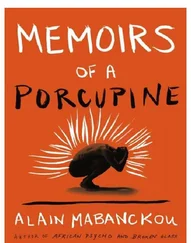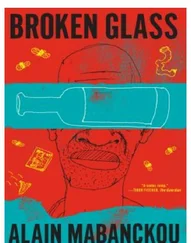Maman Pauline left the district two months after my arrival. No way was she going to spend her time arguing with women who said untrue things about herself and me. Not that she was afraid of them, she knows how to scratch the face of a wicked woman. When she scratches a wicked woman it looks like she’s written a whole book on her face, in Arabic or Chinese. But she didn’t want any of that.
I don’t actually know what Mouyondzi district looks like, out in the region of Bouenza, in the southern bush. Since all I’ve seen there is the sky, I imagine the earth must be red, like everywhere in Bouenza. That’s what our teacher says in geography, anyway. I also imagine that people’s animals down there — particularly pigs — go wandering wherever they like. I mention pigs because according to my mother the inhabitants of Mouyondzi love pig and eat it with plantain bananas whenever there’s a party, or someone’s just died. I imagine, too, that if the fathers in this district are all like Maman Pauline’s policeman, there must be lots of other children without a father and lots of other mothers living alone with their children. I have no wish to go there, not now or ever, I’ll only hate the people and want to wage global war on them, especially the policemen.
I feel like a real child of Pointe-Noire. Here’s where I learned to walk, to talk. Here’s where I first saw rain fall, and wherever you see your first rain fall, that’s where you come from. Papa Roger told me that once, and I think he was right.
When she left Mouyondzi district, Maman Pauline didn’t want to go back to the village where she’d been born — she knew the people of Louboulou would laugh at her. She chose the town of Pointe-Noire because Uncle René already lived there and had just finished his studies in France. With our people it is common for the children to be given the names of the uncles, and my mother gave me Uncle René’s name, even though he’s not my father. My uncle was very pleased my mother chose him rather than their big brother, Uncle Albert Moukila, who worked for the electricity company.
The good thing was that Uncle René was quite happy for Maman Pauline to come and live at his house, with me too, and he gave her a bit of money so she could set up her peanut business at the Grand Marché. She got up in the morning and went straight down to Mtoba, where she bought sacks of peanuts from the farmers. After that she shelled the peanuts and put them into bowls. At the Grand Marché she sat behind her table and waited for customers. Sometimes business was good, sometimes not. But even when it wasn’t, she’d say it didn’t matter, tomorrow would be better than today. She was never going to get rich with this business. At least she could buy me milk and nappies instead of having to ask Uncle René all the time. Now what she didn’t know was, there in the Grand Marché, her life was about to change. Mine too.
…..
It was one very hot Sunday afternoon. The Grand Marché was pretty empty. She looked up and saw a man in front of her table, not very tall, well-combed hair, a well-ironed shirt and a briefcase in his left hand. At first she thought it was one of those bad men who sometimes come round asking the stallholders to pay a fee to the town hall, or else there’ll be no table for them the next day at the market. When you come across a bad man, you always feel a bit afraid, but in this case she felt her legs trembling, as though her heart was about to fall into her stomach — she says that’s what happens when she’s in love. The man with the briefcase bought lots of peanuts and my mother guessed straightaway that anyone who buys peanuts like there’s no tomorrow must have a large family to feed. No one can eat all that themselves. So she added lots of extra peanuts, and even reduced the price.
After that, the man with the briefcase turned up regularly at my mother’s table. He stopped buying peanuts from anyone else, and if she wasn’t there he left and came back the next day, which really annoyed the other stallholders, who now spread a rumour that Maman Pauline hid Bembé gris-gris under the table to snare clients, and that her peanuts were prepared overnight by the spirits, who put a bit of salt on them. They said the moment you tasted one of my mother’s peanuts you were done for, you’d be condemned to return forever to her table, like it was the Congolese National Lottery, which you can never win unless you’re part of the President’s family.
When Maman Pauline got to her table she found the ground all around it was wet, and there was a strong smell of fish. In fact, it was the other stallholders who threw seawater on the ground so customers wouldn’t stop at my mother’s stand. I couldn’t understand why anyone would be afraid of seawater, and Maman Pauline explained that there are lots of spirits in the sea, including the spirits of our ancestors, who are angry because they were captured and taken into slavery on the white men’s plantations, and whipped from dawn till dusk. So that’s why seawater is salty, from the sweat of our ancestors and their anger, which makes the waves.
My mother found it quite funny that people threw seawater under her table, as though the spirits were going to waste their precious time on a little peanut stall when there are more important things in this world. The customers still came, including the man with the briefcase. But Maman Pauline could tell this man didn’t just come to buy peanuts. He had something else in mind, he had his eye on that place where men like looking at women and imagining things I’ll like imagining too, when I’m twenty. Now it wasn’t the man with the briefcase’s fault because Maman Pauline did wear bright orange, shiny trousers stretched tight across her behind. Men just couldn’t take their eyes off it, it was too good to miss. When she walked in the streets of Pointe-Noire men would turn round and whistle, but she pretended not to notice and just went on her way to the Grand Marché.
When my mother had finished serving him, the man with the briefcase would linger by her table, talking and talking. And little by little his banter did the trick, because my mother enjoyed listening to him. He finally saw me in the flesh one day when Maman Pauline put me in a big aluminium basin with bedding in, because prams were too expensive and I hated being carried on her back in a sling, the way women in our country carry their children in the street. The man with the briefcase leaned over the basin, pulled aside the bedding hiding my face and asked how old I was. Maman Pauline told him I was only five and a half months. He looked at me in silence for a few minutes, then began pulling faces, to make me laugh. He remarked how like my mother I looked, and that I wasn’t crying, even though the Grand Marché was full of noise and people shouting. Maman Pauline swears at that moment I smiled at the man. And, again according to her, what my smile meant was: Maman, this is your man, you stick with him, I want this man as my father, my true father, a man who smiles like that isn’t going to abandon us; besides, he’s not a policeman, he’s not going to threaten you with a gun, like in the films.
My mother and the man with the briefcase would go and drink in the bars at the Grand Marché. They hid away like that for months and months. Sometimes they took me with them, when there was no one to look after me. I went on smiling at the nice kind man, whenever he leaned over to look at me, and pull faces. After a year and a half they’d had enough of playing hide-and-seek as we call it in the playground at Trois-Martyrs. The man with the briefcase came to introduce himself to Uncle René one afternoon. He said his name was Roger Kimangou and he worked in the town centre at the Hotel Victory Palace. He explained that he was a responsible man and would do whatever was necessary for Maman Pauline to become his wife.
Читать дальше
